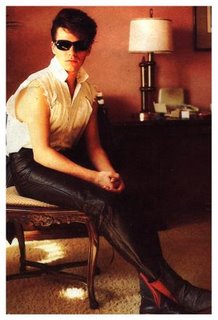Oracle of the Obvious
It's 8 a.m., and I'm in bed with my laptop (praise you, Gods of the wireless technology!), in large measure because it's the only way not to freeze my butt off in our house. 56 degrees on waking up (curse you, Gods of old houses with leaky windows!). It does however promise to be a beautiful morning in my corner of the world; the sun is shining, and it's going to be a bit warmer today.
Apparently, it's reached the point in the semester where everyone is too busy to have multiple meetings weekly (as they did at the beginning of the semester, when they felt fresh and ambitious, rather than bogged down and recalcitrant, like now), and thus I don't have to be anywhere until 2 this afternoon.
My thoughts on waking (right after "oh crap. I forgot to email my pair of students who are just about to fail a class project worth 20% of their grades), was: Wow! I have HOURS to myself this morning! I could get a TON of stuff done!! This was quickly followed by: oh, except for that lingering stack of drafts that I need to comment on. Damn.
Ah, the circle of life at a SLAC. The promise of time, thwarted by the consistent interaction with students and their work. Sometimes, I truly wish that I didn't know how well process-writing worked. My life would be so much easier if I just assigned papers and graded them, without all of this silly drafting/commenting/revision work in between--a process we should just go ahead and call "The Time Suck." TST, however, has hidden benefits, however, that make it worth the time tradeoff. 1) When students hand you drafts of an assignment which includes extensive work in summarizing, you can troubleshoot widespread, unintended plagiarism with them in class, before they hand in the final copy and you have to go apeshit because they have, in essence, taken every other sentence out of the article they're working on. 2) Drafting lets you ask questions, request more information and interpretation, etc. in papers as time goes on, and thus in the end, you get to read better papers. 2.5--a follow-up example: I'm working with a student on a paper that she began writing for me in the fall of 2005. She's on her 4th draft (for reasons which require a post all their own). It's finally getting really good. Which means, I think, that it takes time and rewriting to get products you really enjoy out of students.
So, the moral of this story, kids, (and now is the time to reference the title of the post), is that willing engagement in TST before they hand in a finished version has a measurable positive effect at the end. I find, for my money, that it helps me avoid that feeling of anger at the student--always a good thing.
Now if only I could speed up the draft-return rate...






